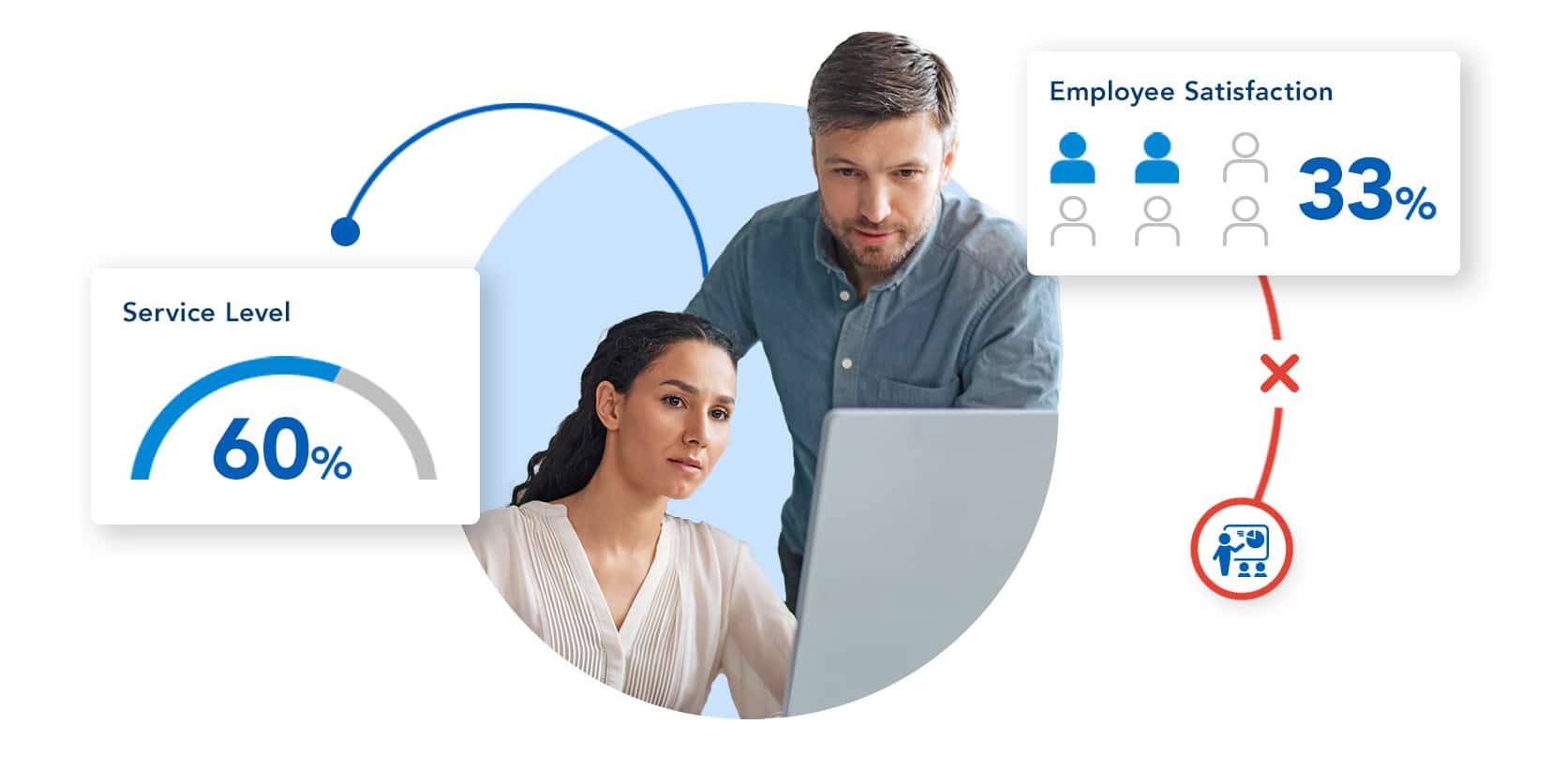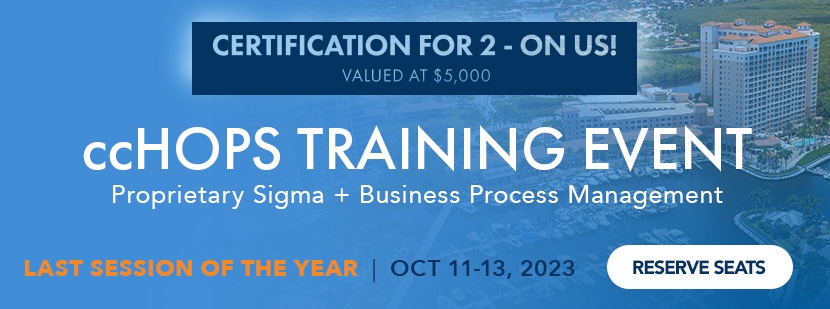

How Call Center Training Gaps are Impacting These 7 KPIs
Training is the foundation upon which exceptional call center operations are built. When your contact center employees are equipped with the right operational knowledge, skills, and tools, they can effectively address customer inquiries, resolve issues promptly, and ensure a positive customer experience. However, when call center training gaps emerge, it directly affects the ability to achieve critical contact center KPIs.
Training gaps within your organization is a normal part of contact center growth and development. That’s why knowing which negative call center metric trends may demonstrate a need for new or upgraded training before the knowledge gap impedes organizational success is vital. As businesses strive to deliver exceptional customer experiences, they must acknowledge the critical role training plays in shaping their Key Performance Indicators (KPIs) that directly influence the bottom line.
Let’s explore the performance consequences of call center training gaps, and the training focuses that can right the operational ship before it’s too late.
What are Call Center Training Gaps?
Call center training gaps refer to areas where employees lack the knowledge or skills required to achieve specific work goals. Recognizing and resolving these gaps is vital for organizations to ensure their call center workforce possesses the necessary capabilities to perform optimally and contribute to the overall success of the company.
7 Contact Center Metric Performance Trends That Indicate Poor Training
Declining Customer Satisfaction (CSAT)
Declining call center CSAT is often linked to suboptimal training. Without adequate training, contact center agents may provide inconsistent responses to customer queries, fail to establish a relationship that drives brand loyalty, create unnecessary escalations, and ultimately, create a bad customer experience.
The good news is that nearly every training program you implement has the potential to impact call center customer satisfaction. Well-trained agents are infinitely more capable of providing excellent customer service than those without the proper knowledge required to exceed customer expectations.
Upskill your employees for improved call center customer satisfaction with courses such as:
- Soft skills
- Knowledge management
- Call handling
- Comprehensive new hire onboarding
- WFM optimization
Poor Employee Satisfaction Scores
When contact center agents don’t receive proper call center training and development opportunities, they may feel unprepared and unsupported in their roles. This leads to increased stress and frustration, ultimately resulting in higher employee turnover rates.
Employee satisfaction is supported by training programs that focus on skills such as:
- Customer de-escalation
- Products and services
- Knowledge management
- Client relationship management (CRM) software
- Omnichannel system operations
- Change management
Low Sales Conversions
Are you seeing a downward trend in the rate of customer interactions resulting in successful sales? Proper call center training in sales techniques and the products and services specific to your business can improve agents’ ability to convert leads to sales by building a trusting relationship with customers and successfully demonstrating the agent’s industry expertise.
Educating to promote sales conversions should emphasize training on areas like:
- Effective communication
- Influential conversation
- Relationship building
- Products and services
Decreasing Revenue
For most organizations, identifying a decline in revenue results in the immediate pressing of the panic button. This is the moment when many leaders start overturning every operational stone to find the culprit. They often find that the usual suspects of available products and services, systems, and processes are functioning without issue and the actual problem lies within their current call center training curriculum.
When you empower your employees, particularly your call center agents, with the skills required to generate more and higher price point sales, you directly support an operation that drives company revenue.
In addition to the same set of skills that encourage improved sales conversion rates, valuable sales training focuses on revenue-driving techniques, such as:
- Upselling and cross-selling strategies
- Using probing questions
- Closing sales
- Identifying unvoiced customer needs
- Building long-term customer rapport
Increasing Average Handle Time (AHT)
We’ve all been there — you call an organization’s customer service line hoping for a quick fix to resolve our consumer needs, only to be stuck in a support interaction that takes 10 times longer than you’d hoped. Everyone can agree that a long call handling time equals a poor customer experience and decreases the chance that you will remain loyal to the company.
Agents who lack effective call center training often take longer to resolve customer issues, causing increased call handling times. These prolonged interactions not only frustrate customers, but also reduce call center efficiency.
Enable improved contact center AHT scores by training your employees in topics like:
- Workforce management reporting and analytics
- Knowledge management system utilization
- Effective communication
- Technical support
- Frontline leadership
Low First Call Resolution (FCR) Rate
First call resolution is one of the most challenging contact center metrics to define and measure and an even harder metric to root cause. Before implementing process and platform changes to drive efficiencies, start by evaluating how your training program impacts employees’ ability to meet customer needs in full and immediacy.
Proper training enables agents to handle customer inquiries more efficiently, not only reducing the time spent on each call, but improving the overall productivity and outcomes so the customer’s needs are managed during first contact.
Call center training courses that support improvement to call center FCR include:
- Product and service training
- Customer de-escalation
- Frontline leadership
- Effective coaching
- KMS software
Declining Quality Assurance (QA)
Many organizations understand the necessity of training their quality program personnel in how to conduct their duties but fail to understand the importance of providing call center quality training to other roles, including the individuals that directly communicate the most frequently with customers: your agents.
Comprehensive training ensures that employees are properly trained to support a customer-centric approach and ensures employees follow the same call center SOPs, promoting consistency, memorable encounters, and an exceptional customer experience.
You can train your call center staff to provide high quality service by focusing training on:
- Voice of the Customer
- Products and services
- Quality monitoring
- Compliance requirements
- Current platforms and software
Achieving Excellence in Contact Center Operations
Call center training gaps can significantly impact critical KPIs, affecting customer satisfaction, loyalty, and overall business performance. By identifying downward trends in contact center KPIs, call center leaders can empower themselves to root cause training inefficiencies before they impact the bottom line. A well-trained and motivated team is the key to bridging the gap and achieving excellence in call center operations.
Looking to identify your organization’s training gaps to establish and maintain healthy metric performance year after year? Download our extensive training course catalog and work with Insite to empower every employee to be an industry expert.
Final Certification Event of 2023
Come network with other like-minded Executive and Senior-level leaders to learn about best practices that have driven success in their contact centers.
Please join us for 3 days of free best-in-class contact center training and networking designed to achieve greater efficiency, productivity, and profitability. Reserve your spot today!

